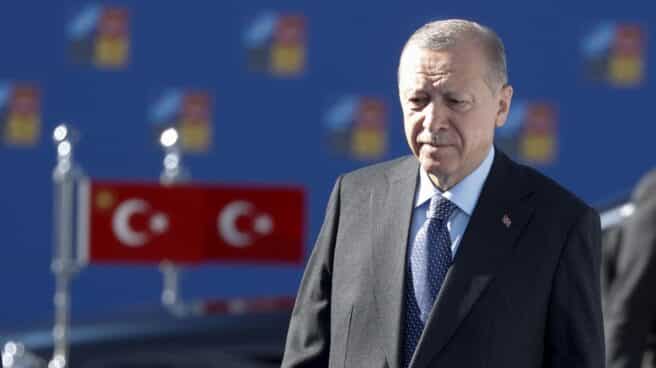

Turkish President Recep Tayyip Erdogan on arrival for the second day of the NATO summit on Thursday.
One of the great achievements of the Madrid summit, clearing the way for Sweden and Finland to join, is still in limbo. Turkey conditions this with the extradition of 73 suspected Kurdish terrorists. Turkish President Recep Tayyip Erdogan, at his press conference following the Madrid summit, assured that “if Sweden and Finland do not comply with the memorandum, Turkey will not comply.” While Erdogan insisted there were 73, Turkish Justice Minister Bekir Bozdag spoke of 33.
On the eve of the start of the Madrid summit, on Tuesday evening, Sweden, Finland and Turkey signed a memorandum making it easier for Ankara to lift the veto on the entry of these Scandinavian countries into NATO. In the document, Sweden and Finland intend to tighten surveillance of members of the Kurdistan Workers’ Party (PKK) and sign an extradition agreement, always in line with “the rule of law in both countries.” In addition, they are lifting the arms embargo on Ankara.
“I am waiting for the promises they made to me. If what is stated in the agreement is not fulfilled, we will act accordingly. They must keep promises. They must pursue a worthy foreign policy. And Erdogan will keep his promises. If I don’t keep my promises, I will be held accountable,” the Turkish president said in Madrid. “Sweden and Finland must comply. If they don’t, the Turkish parliament will vote against it.”
Erdogan called the signing of the trilateral agreement recognition of Ankara’s sensitivity to terrorism and a “diplomatic victory” for Turkey. He ruled out that Turkey made any concessions.
These statements by Erdogan conflict with the euphoria with which the main leaders of the Allies took the decision to give the green light to the inclusion of Sweden and Finland in the Alliance. As Secretary General Jen Stoltenberg said, “The political decision has been made in the North Atlantic Council and the protocol will be signed on Tuesday.”
It then remains for the two countries to complete the adaptation to the requirements, a process that is quick because they are frontline militaries and have already worked with NATO, and the national parliaments will approve the entry. Spain pledged to do so as soon as possible.
NATO Secretary General Jens Stoltenberg called the expansion of the alliance by these two Scandinavian countries a great achievement. He personally participated in this process. Russian leader Vladimir Putin said Russia would retaliate if NATO weapons were deployed in Sweden and Finland. Stoltenberg was categorical: “We are ready for any development of events.”
US President Joe Biden also mentioned expansion to justify strengthening NATO, which is exactly the opposite of Putin’s intentions when he invaded Ukraine on Feb. 24.
Source: El Independiente